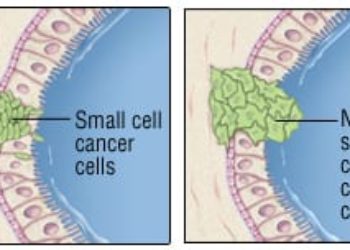USPSTF recommends lung cancer screening in high risk patients
Image: PD
1. Adults between the ages of 55 to 80 years, who have a 30 pack-year smoking history and currently smoke or have quit within the last 15 years, should receive annual low-dose computed tomography (LDCT) screening.
2. Screening should stop after 15 years of non-smoking or if the patient develops a comorbidity that limits life expectancy or the willingness to undergo curative lung cancer surgery.
3. The recommendation is Grade B, meaning that there is a high certainty that the net benefit is “moderate” or “moderate to substantial”.
4. Costs or the potential savings of screening programs were not incorporated into the recommendation, and the USPSTF emphasized that tobacco cessation remains the primary way to prevent lung cancer.
Evidence Rating Level: 1 (Excellent)
Statement Rundown: Lung cancer is the leading cause of cancer-related deaths in the United States, and 85 percent of lung cancers in the United States are attributable to smoking. While the majority of lung cancer have an overwhelmingly poor prognosis, early-stage non–small cell lung cancer (NSCLC), the most common lung cancer, can be treated with surgical resection if found early. In an update to the 2004 US Preventive Services Task Force (USPSTF) recommendations on lung cancer screening, the task force reviewed new evidence from randomized controlled trials and cohort studies. As a complement to the review, they also ran modelling studies from the Cancer Intervention and Surveillance Modeling Network (CISNET) to determine at screening age, interval, and project harms and benefits.
The largest trial reviewed, the National Lung Screening Trial (NLST), composed of 50,000+ asymptomatic adults aged 55-74 with at least a 30 pack year history of smoking, randomized current or former smokers to low-dose computed tomography (LDCT) or chest radiography for cancer screening. Patients received annual screening at baseline and were followed for a median of 6.5 years. 2.06% of patients in the chest radiography group and 1.75% of those in the LDCT group died of lung cancer, for an absolute difference of 0.31% (number needed to treat = 320 based on 3 annual screenings). Results revealed a sensitivity of 93.8% and specify of 73.4% for LDCT as compared to a sensitivity of 73.5% and specific of 91.3% for chest radiography. When evaluating effectiveness, the study showed a reduction in lung cancer related mortality by 16% and all-cause mortality by 6.7% in LDCT groups. 24.2% of screenings were positive; 96.4% of these were false-positives (the most common incidental findings were emphysema and coronary artery calcifications). Of note, several smaller European trials showed no benefit, or even harm, to screening. In particular, the Danish Lung Cancer Screening Trial (DLCST), which randomized younger patients to LDCT vs. no LDCT, revealed that the relative risk for all -cause mortality was 1.46 (CI .99-2.15), suggesting screening may increase risk in a young population. Follow up was 4.7 years.
In the modelling studies, annual LDCT screening resulted in the detection of 50% of early-stage lung cancers and a 14% reduction in lung cancer mortality. Authors estimated that 10% to 12% of screen-detected cancer cases would be over diagnosed using LDCT, while the risk for radiation-induced lung cancer death was less than 1%.
Click to read the statement in the Annals of Internal Medicine
Click to read the modeling study in the Annals of Internal Medicine
Click to read an accompanying editorial in the Annals of Internal Medicine
Click to read a second accompanying editorial in the Annals of Internal Medicine
©2012-2013 2minutemedicine.com. All rights reserved. No works may be reproduced without expressed written consent from 2minutemedicine.com. Disclaimer: We present factual information directly from peer reviewed medical journals. No post should be construed as medical advice and is not intended as such by the authors, editors, staff or by 2minutemedicine.com. PLEASE SEE A HEALTHCARE PROVIDER IN YOUR AREA IF YOU SEEK MEDICAL ADVICE OF ANY SORT.





